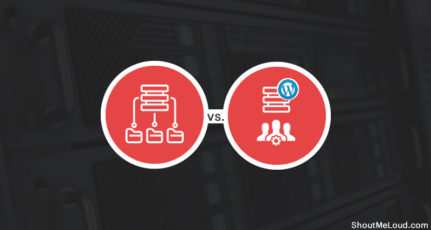Last year, Srikanth posted a review of SiteGround, and after hearing great recommendations from other users, I purchased their GrowBig plan using this SiteGround discount coupon.
A few months ago I moved a few of my sites away from Hostgator to SiteGround, as my Hostgator subscription was expiring. It has now been more than three months since I began using SiteGround as the hosting service for five of my small WordPress sites. This period of use has given me enough time to experience the pros and cons of SiteGround hosting.
SiteGround offers an in-house caching mechanism called SuperCacher, which makes your WordPress blog load blazingly fast. SuperCacher technology offers caching at three levels:
- Varnish Static Cache
- Varnish Dynamic Cache
- Memcache
These caching mechanisms are impressive and make SiteGround hosting stand out.
Apart from this, SiteGround also offers:
- Free SSL Certificate
- PHP 7.x support
- SSD Hard drive
Despite the excellent hosting quality offered by SiteGround, this one limitation could make you rethink the possibility of purchasing a hosting package from them.
CPU seconds per account – SiteGround’s biggest limitation
If you are running a medium traffic WordPress site, or any other site that is dynamic, you may or may not face issues based on SiteGround’s constraints. If you consider purchasing a hosting package from SiteGround and investigate their plans, you will notice that their plans are suitable for X number of visitors.
Here is a screenshot of all of the shared hosting plans offered by SiteGround:

- StartUp: Suitable for ~10,000 visits monthly
- GrowBig: Suitable for ~ 25,000 visits monthly
- GoGeek: Suitable for ~ 100,000 visits monthly
SiteGround states that the suggested number of visitors does not impose an upper limit, and should not be seen as a limitation. This is partially true, as SiteGround does not use a per-visit calculation to determine your hosting usage. But, they do use CPU seconds to calculate the usage.
What is a CPU cycle on SiteGround Hosting?
According to the official SiteGround knowledge base:
A simple example of an execution is when a visitor opens your website, and your index PHP file is loaded. This counts as one execution. The more visitors your website has, the more executions it will generate. Please note that this is valid only for dynamically generated content. If you open a picture or an HTML page, a new execution will not be generated on the server. Executions are counted for the following scripting languages – PHP, Perl, Python, Ruby, etc.
Because 21% of the websites in the world are powered by WordPress which uses PHP, every single visit for WordPress users means one CPY cycle. So relating this to “Suitable for X visits monthly” does impose a limitation on WordPress users, i.e., 21% of all websites in the world.
My sites went offline on SiteGround
I mentioned earlier that I have five WordPress sites running on SiteGround. Following are the monthly traffic stats for all five blogs:
- CallingAllGeeks: 61K page views last month
- WPFreeSetup: 3K page views Last month
- WPHostingDiscount: 3.5K page views last month
- Other two sites: Approximately 1K page views last month
In total, my SiteGround hosting account GrowBig, which is suitable for 25K visits/monthly, received about 68K page views. Note: All the sites are running on WordPress CMS. For the last two months at the end of my billing cycle, I have gotten a CPU usage warning email from SiteGround.
Here is the first email that I received when my hosting used 90% of my allotted CPU Usage:

In the following 48 hours, I received another email saying the following: “Important: Web Services on callingallgeeks.org is limited due to overage!”
Dear Harsh Agrawal,
We would like to inform you that your account callingallgeeks.org exceeded the monthly allowed number of CPU seconds per account, and your web service is limited for the calendar month. The limit will be removed automatically at 00:10 a.m. CDT on the first day of the next calendar month and service will be fully restored.

In short, my websites were temporarily suspended until the start of the next calendar month.
SiteGround customer support to the rescue:
If something similar were to happen for you as a SiteGround customer, do not lose heart, as SiteGround’s customer support is excellent. In my case, I pinged the SiteGround customer support and informed them of the issue, and they gladly added 20K extra CPU seconds to my account. My sites were up after a few hours of downtime, which is somewhat comforting.

Additional steps to reduce the CPU cycle:
SiteGround has this resource page that shows how to reduce the CPU executions on your hosting account. Here are a few things that I did to lower the CPU cycle:
- Added Cloudflare CDN
- Enabled SuperCacher (Guide)
- Checked my AWStats using SiteGround cPanel, and blocked leechers and spammy I.P. addresses
Because of my engineering background, it was relatively easy for me to get all of this accomplished. At the same time, it caused me to ask myself the question, “Should I recommend SiteGround to new bloggers?”
An experienced blogger can take action to optimize his or her WordPress and hosting services, but this is not something everyone is capable of doing. Moreover, SiteGround’s CPU seconds usage limit is far too low. Because we live in a world where a site can go viral anytime, SiteGround’s CPU seconds usage is a very significant limitation which every user should be aware of before purchasing hosting from SiteGround.
As an end user, I love SiteGround because of the technology enhancements they are running.
SuperCacher is a great technology, especially for blogs or websites running on WordPress CMS. They have also recently introduced HHVM technology for their cloud hosting, and they seem to be one of the more progressive hosting companies around. At the same time, their CPU seconds usage is so significant a limitation as to render SiteGround a service that is not recommended for any growing blog or website.
Until the time when SiteGround reconsiders their CPU usage limits to the extent that they at least impose an acceptable level, I suggest that you buy hosting from SiteGround alternative sites such as Bluehost or A2Hosting. (Both of these hosting services have higher CPU cycle usage limits.)
I will be updating the ShoutMeLoud recommended WordPress hosting page to reflect the necessary changes.
Let me know if you have ever faced similar issues to mine when using SiteGround’s hosting services. Would you recommend SiteGround’s shared hosting to other users? Use the comments section below to tell us why or why not.






Harsh, I am dealing with the exact same problem right now. I started a SG Reseller hosting account, and only added 2 clients and I already went over my CPU limit. I’ve tried all the recommendations too, and did what the support tickets recommended. SG is great but this is a deal breaker! Looking at inMotion or ResellerClub which Bluehost recommends, or maybe A2 Hosting.
I’d say avoid Siteground at all costs! Yes, they are top notch with their supports but in the end if your sites will have to go down for days / weeks over a matter that really hard to fix unless you are a techy person or you open your wallet (again!) to upgrade, then it really is unacceptable.
I found it a hard way when my ‘inode’ usage reaching 80% and I got bombarded by emails from SG warning me about it on daily basis, so I was forced to delete some of my blogs that barely have anything in it (few are just for testing) just to lowered the ‘inode’ counts. Unfortunately, deleting those sites just not enough cos the inodes crept back up steadily. So I decided to do some research and found that Dreamhost is practically the only affordable hosting that has no limitations with inodes and will let me host my sites with monthly payment. I have moved many of my wordpress sites from SG to Dreamhost now, and 5 wp sites still with SG.
Today I learnt that few of my sites in SG are down due to excessive amounts of CPU time usage. What an utter disappointment, despite my due diligence to take some load off of SG, still it is not enough 🙁 I will be so happy to leave SG all together by the time my subscription over in 2021 (doh!). Such a waste of money :((
Thanks for the tip about Dreamhost — I’ve run into the same problem with SiteGround and find most other hosts don’t spell out their CPU limitations. Didn’t want to jump from the frying pan into the fire. My first two years with SiteGround were wonderful, but probably because I was too busy with side projects to build out my sites. A few months ago I added roughly 30K words to one site (in 24+ separate posts) and began getting traffic ~ 100 visitors per day. That series of events has made my site nearly unuseable – it times out due to CPU usage. Very disappointing. So now I am in a rush to find a better host and migrate!
I don’t have an IT background so when I noticed my site would occasionly go down, it made no sense to me, so i just upgraded as suggested… 3 times. Unfortunately the problem was still there, my website kept going down. So i started migrating a few websites away, problem still there. Eventually I got so frustrated I just started to migrate everything. The strange thing is I migrated my websites individually to the CHEAPEST plan on Krystal hosting and not only do they work fine now but according to google insights, they load faster. It surprised me as Siteground seems to have all the bells and whistle hosting. Migration could’ve been better by Krystal but you can’t win them all.
And another thing, siteground blocked me from using Support Chat due to the number of times I had contacted them regarding this problem. So support is good but if you use it too much they block you.